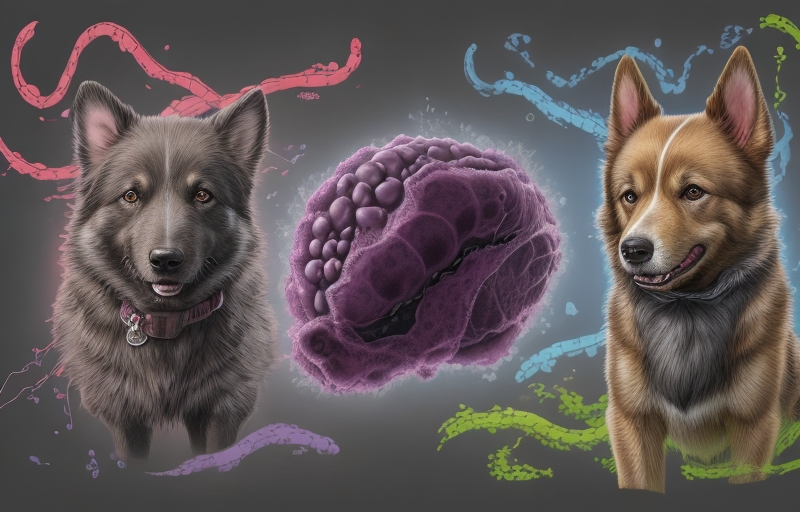If you are a dog owner looking to understand the Causes of Spleen Cancer in Dogs, this guide is for you. Cancer, or splenic hemangiosarcoma, is a complex and often aggressive disease in dogs. While the exact cause remains elusive, several factors may contribute to the development of spleen cancer in our canine companions. This guide will help you understand the root causes and treatment of spleen cancer.
Understanding the Causes of Spleen Cancer in Dogs
Genetic Predisposition:
Certain dog breeds have been identified as having a higher predisposition to spleen cancer. Breeds such as German Shepherds, Golden Retrievers, and Labrador Retrievers are more commonly affected. Genetic factors may play a role in making these breeds more susceptible to the disease.
Age and Gender:

Spleen cancer is frequently diagnosed in older dogs, with the risk increasing as they age. Female dogs, in particular, seem to be more prone to developing splenic hemangiosarcoma. While it can occur in dogs of any age or gender, knowing these demographic patterns aids in early detection.
Environmental Factors:
Exposure to certain environmental factors may contribute to the development of spleen cancer. Carcinogens, pollutants, and other environmental toxins could potentially play a role in triggering cancerous changes in the spleen cells. However, the specific agents involved are not yet clearly defined.
Immune System Dysfunction:
A weakened immune system could be a contributing factor in the development of spleen cancer. Dogs with compromised immune function may struggle to detect and eliminate abnormal cells, allowing cancer to progress unchecked. Underlying health conditions or chronic diseases may compromise the immune system’s ability to regulate cell growth.
Hormonal Influence:

Hormonal changes or imbalances might also be linked to the development of spleen cancer in dogs. Research suggests hormonal factors could influence the growth and progression of cancer cells in the spleen. However, the interplay between hormones and splenic hemangiosarcoma requires further investigation.
Hereditary Factors:
In addition to breed-related genetic predispositions, hereditary factors within specific bloodlines may contribute to an increased risk of spleen cancer. Dogs with a family history of the disease may have a higher likelihood of developing splenic hemangiosarcoma.
Underlying Health Conditions:
Dogs with certain underlying health conditions, such as hemophilia or certain blood disorders, may be at a higher risk for developing spleen cancer. Understanding the interconnections between these health issues and splenic hemangiosarcoma is crucial for a comprehensive view of the disease.
Treatment Approaches for Dogs with Spleen Cancer

Dealing with spleen cancer in dogs requires a multifaceted approach that often combines surgical intervention, chemotherapy, and supportive care. The treatment plan is tailored to the individual dog, considering factors such as the cancer’s stage, overall health, and the owner’s preferences. Here’s an in-depth look at the various aspects of treating dogs with spleen cancer:
1. Surgical Removal (Splenectomy):
The primary and often immediate course of action for spleen cancer is the surgical removal of the affected spleen. This procedure, known as splenectomy, aims to eliminate the tumor and prevent further complications associated with the disease. The surgeon may also examine adjacent tissues to check for the potential spread of cancer.
2. Chemotherapy:
Post-surgery, chemotherapy is frequently recommended to target any remaining cancer cells and reduce the risk of recurrence. Chemotherapy drugs may be administered orally or intravenously, and the treatment protocol varies based on the specific type and stage of spleen cancer. While chemotherapy can extend survival time, discussing potential side effects with the veterinarian is important.
3. Palliative Care:
In cases where surgery or aggressive treatments may not be viable or when the cancer has already spread, palliative care becomes essential. Palliative care enhances the dog’s quality of life by managing symptoms and providing comfort. Pain management, nutritional support, and monitoring for signs of distress are integral components of palliative care.
4. Monitoring and Follow-up Care:

Regular follow-up appointments with the veterinarian are crucial to monitor the dog’s progress post-treatment. This includes physical examinations, blood tests, and imaging studies to check for any signs of cancer recurrence or complications. Prompt detection of any issues allows for timely intervention.
5. Dietary Adjustments:
A tailored diet may be recommended to support the overall health and well-being of a dog with spleen cancer. High-quality, easily digestible foods can aid in maintaining weight and strength, particularly during and after treatments.
6. Investigational Therapies:
In some cases, veterinarians may explore investigational therapies or clinical trials as part of the treatment plan. These may involve experimental drugs or innovative approaches that aim to improve outcomes for dogs with spleen cancer. Participation in clinical trials is typically discussed on a case-by-case basis.
7. Emotional Support:
The dog and the owner may benefit from emotional support during treatment. Dealing with a pet’s illness can be emotionally challenging, and seeking support from veterinarians, support groups, or pet counselors can be invaluable.
Conclusion
Pet owners must actively communicate with their veterinarians, ask questions, and actively participate in decision-making regarding their dog’s treatment. While spleen cancer in dogs poses challenges, advancements in veterinary medicine offer hope and improved outcomes. A collaborative and informed approach between pet owners and veterinary professionals is vital in navigating the treatment journey with care and compassion.
FAQs
Can diet play a role in managing spleen cancer in dogs?
A tailored diet may be recommended to support the dog’s overall health. High-quality, easily digestible foods can help maintain weight and strength during and after treatments.
How often should a dog with spleen cancer undergo follow-up examinations?
Regular follow-up appointments are essential to monitor the dog’s progress post-treatment. The frequency of follow-up examinations depends on the specific case and the veterinarian’s recommendations.
Are there support groups for owners of dogs with spleen cancer?
There are online and local support groups where owners can share experiences and seek advice. Veterinarians can also provide guidance on resources for emotional support.
What signs indicate a need for palliative care in dogs with spleen cancer?
Palliative care may be considered when aggressive treatments are not feasible or the cancer has spread. Signs such as pain, discomfort, and a decline in overall well-being may indicate the need for palliative measures.
Can dogs with spleen cancer participate in clinical trials?
In some cases, veterinarians may explore investigational therapies or clinical trials. Participation is usually discussed case-by-case, considering the specific details of the dog’s condition.

1 thought on “Understanding the Causes of Spleen Cancer in Dogs: An In-depth View”